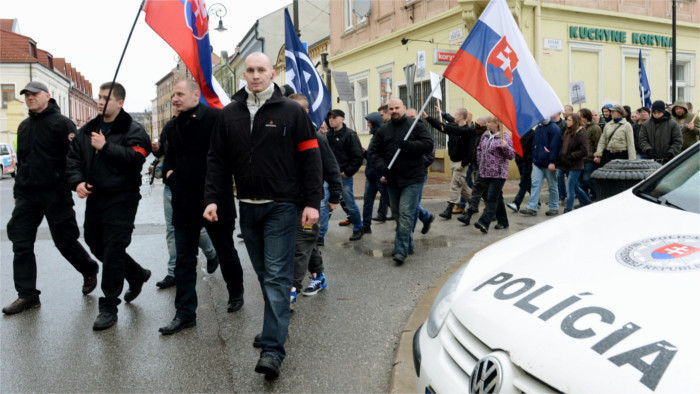A newly published Monitoring Report talks about the state of extremism in Slovakia for 2022 and 2023 by the Interior Ministry. Right-wing groups and new dangerous forms of extremism are threatening society. You will hear from opposition MP Lucia Plaváková as well as the opinion of renowned Slovak extremism expert Daniel Milo.
241021_web Máte problém s prehrávaním? Nahláste nám chybu v prehrávači.
Update, Oct 25, 11:55 am
In last Monday's show, you could hear about the topic of extremism in Slovakia. Specifically, it was a Monitoring report on the state of extremism in Slovakia for the years 2022-2023. We evaluated the most important factors that affect Slovak society the most and how the Ministry of the Interior talks about specific problems in the report. One of the most important points in the report were among others online radicalization and spread of extremism in cyber world in general, impact of international events such as the war in Ukraine and the Israel-Hamas conflict. One of the crucial phenomenons is also the radicalization of youth and young people being more involved in extremist activities in recent years. We turned to the Ministry of the Interior with several questions about these current problems. The statement reads:
When it comes to strategies implemented for solving the issues, the Ministry of Interior details several of them aimed at this challenge. For online extremist activities, the Slovak police force collaborates nationally and internationally to monitor and remove illegal terrorist content online. Currently, the Ministry’s Department for Crime Prevention (OPK MV SR) is finalizing a “Concept of Combatting Radicalization and Extremism by 2028.” This plan, which builds on the Crime Prevention Strategy and aligns with international obligations, was drafted with input from central state bodies, academia, and NGOs. In addition, the Ministry is preparing a deradicalization program model, focusing on structural and procedural aspects to identify roles and processes in preventing extremism. Another upcoming initiative is the “Action Plan for Protecting Soft Targets by 2025,” which will strengthen the protection of public spaces that lack continuous security oversight.
Addressing the rise in youth involvement in extremist activities, the Ministry, recognizing radicalization as a global problem, is bolstering collaboration with schools and parents. In 2023, the Police Force’s Anti-terrorism Center provided specialized materials to the Ministry of Education, including insights on identifying signs of radicalization and current ideological threats. Through victim support offices, the Ministry’s Department for Crime Prevention has launched educational initiatives within schools to raise awareness of hate speech and assist educators in recognizing risky behaviors. In 2024 alone, 238 awareness-raising events reached 4,730 students and 111 school staff, fostering collaboration and communication channels for reporting issues to the police.
Despite a recent decline in extremist prosecutions, the Ministry remains cautious, noting that it is too soon to conclude whether this represents meaningful progress or a shift to less visible extremist tactics. As far-right influences grow on social media, targeting Slovak youth, the Ministry highlights the challenges in managing the spread of violent ideologies across digital borders. The Slovak police are actively involved in enhancing awareness about radicalization, particularly among educators and mental health professionals, often partnering with NGOs to create a well-informed, frontline defense.
In a continued effort to enhance security and crime prevention, the Ministry’s Department for Crime Prevention has proposed a National Project to strengthen soft target resilience. Set to begin in January 2025, this initiative will expand victim support services and prevention efforts across more districts. The project includes seminars for individuals in close contact with public spaces, such as school staff, to raise awareness about sociopathological risks and equip them with skills to identify and address potential threats efficiently.

